SAN DIEGO - Halfway between China and San Francisco, British sailor Andrew Taylor suddenly found himself floating alone in the cold, rough North Pacific.
One moment he'd been helping to change a sail aboard the 70-foot yacht Derry-Londonderry-Doire, and the next he'd fallen overboard, smashed into the rudder and was being swept away in big waves and strong wind.
For a while he was within sight of the sloop, which is competing in The Clipper 2013-14 Round the World Yacht Race.
Then he wasn't.
"I never contemplated I would die. I did consider whether the boat would find me," the 46-year-old Taylor told The Associated Press in an interview from the boat via satellite phone on Thursday.
About one hour, 40 minutes after falling into the 52-degree water just past the International Date Line on Monday, Taylor was pulled out by his crewmates. He was treated for hypothermia and his leg was put in a splint. He'll have X-rays after the boat arrives in San Francisco on either April 11 or 12.
Taylor, a catering manager from London, said he never panicked and never gave up hope of being rescued because he knew his fellow crew members were well-trained for a man-overboard emergency.
"I just want to express my gratitude to the team for their work and effort," said Taylor, who had never set foot aboard a boat before he began training for this race in 2012. "It was a traumatic experience for everyone, for the crew as well as for me in the water."
Sir Robin Knox-Johnston, the first person to sail solo non-stop around the world, founded the Clipper Race to allow anyone, regardless of previous sailing experience, the chance to experience ocean racing. Every crew member has to complete a rigorous training plan.
Ocean racing can be incredibly dangerous.
In 2006, Dutch sailor Hans Horrevoets died after being swept overboard during the Volvo Ocean Race about 1,300 nautical miles west of England. He was pulled out of the ocean but his crewmates couldn't resuscitate him. Three days later, with Horrevoets' body still aboard, ABN AMRO TWO rescued the 10-man crew of rival movistar, which had begun leaking.
In 1997, Makoto Namba, who sailed for Japan in the 1992 and 1995 America's Cup trials, was washed overboard by a large wave and disappeared during a race from Hong Kong to Japan.
In the span of two weeks in April 2012, five sailors were killed during a race off San Francisco and four sailors were killed during a race from Newport Beach, Calif., to Ensenada, Mexico.
Previous major ocean racing disasters have been caused by freak storms, including the one that killed 15 sailors in the Irish Sea in the 1979 Fastnet Race and one that killed six in the 1998 Sydney to Hobart Race.
Taylor knows he was fortunate.
"I believe I'm a very, very lucky boy," he said. "There were many eventualities and possibilities that could have ended very differently."
Before he fell overboard, Taylor was on the foredeck helping skipper Sean McCarter with a sail change. They were having trouble so Taylor started to head back to get a pair of pliers. McCarter was able to unhook the sail when the boat suddenly leaned heavily to leeward.
"One second my feet were on the boat, the next second my head was in the water," Taylor said. "It happened so very, very quickly."
Taylor thought his safety harness was clipped to the boat.
McCarter said in a story posted on the race's website that somewhere between going to get the pliers then not needing them, Taylor got distracted and forgot to clip on again.
McCarter hollered "man overboard" and the crew began turning the boat around. Even after the engine was started, the boat hard a hard time in wind of 35 knots and waves estimated to be between 13 and 19 feet.
The crew could see Taylor about 200 yards away but he was quickly drifting.
"I asked for a heading to the casualty and got the reply I dreaded most; 'We've lost visual.' All of a sudden the North Pacific became a very big place," McCarter said.
Taylor, who was wearing a life jacket and a dry suit, said a sudden storm pushed him farther from the boat and he was having trouble with his personal locator beacon.
"It really got very nasty for a while," he said. "I got rolled over in some of the waves, like a washing machine. By the time the storm passed I didn't know where the boat was."
More than an hour after Taylor fell in the water, a crewman shouted to McCarter that his personal locator beacon had just activated. Another crew member up the mast spotted Taylor more than 400 yards away.
"I heard voices screaming. I heard voices calling my name," said Taylor. "I lifted up my spray hood and the boat was right in front of me."

